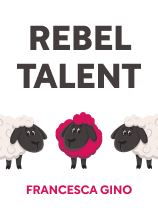

This article is an excerpt from the Shortform book guide to "Rebel Talent" by Francesca Gino. Shortform has the world's best summaries and analyses of books you should be reading.
Like this article? Sign up for a free trial here.
Are you wondering how to be a rebel? Why should you be a rebel in the first place?
Being a rebel is about breaking the rules constructively so you can unleash your creative talents, innovate, and live a fully engaged life. In Rebel Talent, Francesca Gino examines the five elements that drive rebel success.
Let’s look at the five ways you can be a rebel, according to Gino.
Element 1: Rebels Try New Things
Gino explains there are five ways to learn how to be a rebel. The first way rebels break the rules is by embracing new ideas and experiences. Rebels step outside their comfort zone to try things they haven’t done before because they know that it’s the best way to test their limits and that learning about themselves, their capacity, and their potential leads to growth.
Why Trying New Things Is Important, Even When It’s Hard
Reason 1: Embracing the unexpected can challenge you and help you grow.
Gino says it can be difficult to embrace new things because society is steeped in rituals and traditions that communicate and foster important value systems and give us a sense of meaning, connection, and comfort.
But when you accept things as they are simply because they’ve always been done a certain way, you can stagnate and lose out on valuable experience that comes with making difficult decisions. Staying in your comfort zone may feel safe but isn’t always the recipe for growth and happiness.
When you try new things and gain new skills, Gino says, your sense of self and the way you talk about yourself expand; you become more confident in your ability to do new things; and your tolerance for uncertainty increases, which helps you achieve your goals even when you encounter bumps in the road.
Element 2: Rebels Ask Questions
The second way rebels break the rules is by always asking questions. Gino says rebels constantly ask questions and gather information to better understand and connect to the people around them, tap into their creativity, and innovate.
Why Being Inquisitive Is Important
Asking people questions helps build connections and leads to better performance at work.
- Gino says that when you show people that you care about their opinions and experiences, you gain their trust and admiration by making them feel supported; also, you build relationships that can help you overcome obstacles.
Gino’s research found that:
- Study participants had more favorable opinions of people who asked them more questions compared with people who asked them fewer.
- Study participants’ perceptions of other people’s competency increased when those people asked participants for advice.
- Inquisitive employees are often companies’ top performers.
Gino cites additional research showing that people are more satisfied and feel more supported when others demonstrate curiosity about them by asking them questions.
Element 3: Rebels Work to Expand Their Base of Knowledge
The third way rebels break the rules is by seeking out knowledge wherever and whenever they can. According to Gino, rebels walk into every experience, new and old, to learn something from it, build on their existing knowledge base, and prevent blindspots that would limit their ability to realize their greatest potential.
Why Building Your Knowledge Base Is Important
When you commit to being a lifelong learner you can see situations from angles you haven’t considered before and tackle problems more effectively.
For example, teaching is a profession filled with lifelong learners who are curious about and committed to constantly growing, gaining knowledge, and seeing things in new ways—both for their own edification and the benefit of their students. Lifelong learning is built into their professional lives through ongoing professional development sessions. Teachers drew upon their abilities as lifelong learners when the COVID-19 pandemic hit—when the school doors shut, they pivoted to reimagine classroom instruction.
Element 4: Rebels Fight Categorization and Stereotypes
The fourth way rebels break the rules is by rejecting labels assigned by others and embracing different viewpoints. Gino notes that rebels refuse to be limited by others’ definitions of them because they understand that people’s greatest potential and strength lies in their individuality, and that bringing unique voices and perspectives into conversations leads to innovation.
Why Resisting Labels and Welcoming Different Viewpoints Is Important
When you refuse to let people assign you a lane, you can create your own lane and help others do the same.
Gino says that when you push back against restrictive and damaging assumptions that other people make about you and focus on possibilities instead of limitations, you can chart your own course and blaze a trail for others.
For example, tennis great Serena Williams defied categorization and obliterated the constraints of social norms, both on and off the tennis court, since she rose to prominence in the world of tennis at age 17. The winner of 23 Grand Slam titles, Williams has carved her own path by refusing to let others pigeonhole her as only a powerhouse athlete. She is also an advocate for racial and gender equality, a challenger of mainstream beauty norms, and a highlighter of racial health inequities. In her defiance of categorization, Williams has created a path for others to follow in her footsteps.
Element 5: Rebels Show Their True Selves to the World
The fifth way rebels break the rules is by being open about who they are and the challenges they face, even when they know they’ll face backlash for bucking social norms. Rebels say, “This is who I am, in all my imperfect glory,” because they understand the power of vulnerability to connect them with other people, and they know they bring their greatest strengths to the table when they are truly being themselves.
Why Being “Truly You” Is Important
Showing your vulnerability and owning your flaws makes you more relatable to other people and deepens your connections with them.
Gino says that when you’re open and honest about your failures and the challenges you’ve faced, you can inspire and be a role model for others.
For example, gymnast Simone Biles showed her vulnerability when she cited stress, not physical problems, as the reason she was pulling out of two competition events at the 2021 Olympics. Biles’s announcement that she wouldn’t compete, and her honesty about why, were risky, given the pressure on her to bring home gold and the stigma surrounding mental health issues. Her decision to be vulnerable, even in the face of inevitable public scrutiny and attacks on her character, demonstrated her strength and humanity and made her a role model for others.
In contrast, Gino says, when you act in ways that don’t show others what you’re truly feeling and experiencing, when you “fake it” or do things to make other people happy, your health and well-being can suffer.

———End of Preview———
Like what you just read? Read the rest of the world's best book summary and analysis of Francesca Gino's "Rebel Talent" at Shortform.
Here's what you'll find in our full Rebel Talent summary:
- Why you should tap into your inner rule breaker
- A guide on how to break the rules constructively
- The three principles for becoming a rebel leader






